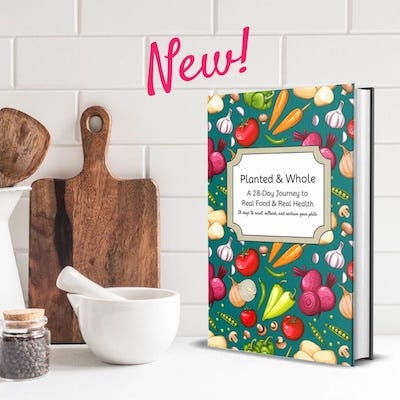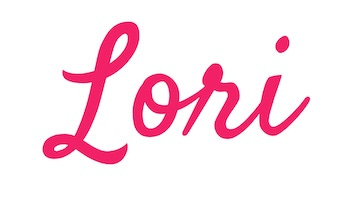How To Make Journaling Your Secret Weapon for Plant-Based Success
My simplified approach to transforming relationships with food
Welcome to Roots! A newsletter about plant-based: eating, nutrition, lifestyle, I cover it all. Join me, Lori Osterberg, as I explore good food, great health, and Gorgeous Wellth! New here? Get started.
I know. Another attempt at journaling. Even the thought makes you think: Ho, hum. Because … How many half-journals do you own? You buy them with good intentions, you sit down and fill out the first few pages with gusto. Then, life happens. The journal sits on your desk, collecting dust. You open it a few weeks or months later, wondering what happened.
I’ve been there.
I’ve tried all kinds of journals. I have a gorgeous (and very expensive) journal a coach recommended to me several years ago. I pick it up occasionally, wishing I could give it a go.
But it’s too …
You know what I mean. I just can’t get my head around the content. I get too busy and I just can’t work with it.
And yet, I’m a journaler. I LOVE journaling. I’ve used them for years.
When done right, I find my journal becomes my therapist. The act of writing helps slow down my mind and helps me untangle what’s bothering me. It enlightens me. It helps me dig into thoughts I didn’t know I was having. See patterns I didn’t know existed.
Yes, even a blank journal - one with just a bunch of lines spread across the page - can be life-changing.
I’ve come to discover it isn’t the journal - it’s the intent.
If I’m stuck, I can’t get into specifics I haven’t uncovered yet. No journal will work if it asks you questions you don’t have answers for. And there’s no inspiration to reach those answers. (Yes, that’s possibly a reason why the gorgeous journal I talked about earlier doesn’t work. It’s too detailed, and doesn’t work for the areas I need help most.)
But structure is important. Direction. Giving you what you need when you need it most.
Enter food journaling.
Years ago, I read about it but didn’t try it. Food journaling - why did I need that?
Somewhere along the way, I started looking at it through different eyes. Food journaling helps in so many ways:
Creates awareness about eating habits
Identifies patterns and triggers for certain food choices
Helps connect food choices with physical and emotional responses
Provides accountability
Serves as a record of progress over time
Helps with meal planning and grocery shopping
Yes!
Food journaling isn’t something you have to do every day for the rest of your life. (But you can.) I read a story about a woman who has tracked her food for most of her adult life. If and when she has issues, she can go back in time to discover how and where her eating changed. She makes adjustments accordingly.
That’s powerful.
It also may sound extreme. Do you really want to track everything you eat FOR THE REST OF YOUR LIFE?
I’m not even remotely suggesting it. You don’t have to.
It’s time to challenge your perceptions
I have a morning routine that involves meditation, journaling, reading, and a few yoga stretches. The books I read “find me.” I may read about them on Substack, or have something recommended from a friend. I’ve read cookbooks, self-help books, political books … you name it. I reserve novels for later in the day, but any nonfiction is fair game for my morning routine.
I recently read a productivity book called Do Nothing by Celeste Headlee.
“Many people in the industrialized world have what I call “busyness delusion,” or the mistaken belief that we are busier than we really are. This may be difficult to accept, but many of us tend to think we work more hours than we actually do.”
What caught my attention was her next thought:
“I know I regularly feel exhausted at the end of my day and I’m barely able to drag myself on a walk with my dog, let alone start cooking a meal. Perhaps that’s why the meal kit industry, which began in 2007, grew so quickly that eleven years later, it was worth up to $5 billion.”
See? Proof we’re not alone. Everyone feels it. We’re all working ourselves to the bone. Work is consuming too many of our hours. But as Headlee continues, she says surveys don’t support that.
“Men today work about twelve hours less per week than they did in the 1970s. Women work more, partly because many more women have full-time jobs than they did fifty years ago, but their unpaid labor has dropped by double digits.
When working mothers kept diaries for several weeks recently, they found they had much more time with their children than they thought. In fact, the total time spent working has not risen since the 1990s and parents in general are spending more hours with their children every week.”
Perception doesn’t equal reality.
Are we busy because everyone tells us we’re busy? Media, books, podcasts, television - everybody tells us how busy we truly are.
“Regardless of whether you’re really working excessive hours or not, believing that you are short on time has real, damaging effects. Keeping your eye on the clock, even subconsciously, can lead to a sharp drop in performance. Research shows that when you are highly aware of time passing, it even makes you less compassionate toward others. What’s more, it can interfere with your ability to make rational decisions.”
What it comes down to is “time perception.” If you have no clear understanding of how you spend your time, it can leave you feeling overwhelmed. This adds stress to your days and allows you to make decisions from a place of stress, leaving you in a perpetual circle of overwhelm.
When you increase your time perception and become very aware of where your time is going, you can contemplate and reflect, allowing you to make better choices overall.
The solution? A time journal. Track where your time is going and you’ll find ways to add in more fun. Those 30 minutes scrolling on social media throughout the day can be eliminated and added together for a class you’ve been wanting to take. Or built into a day just to give you time to relax.
The crossover to food journaling
Yes, it works for productivity. It’s the method I use to get more done.
But it’s also what led me to food journaling.
Because you can’t control what you don’t see. And with a low perception of your food choices, you won't have a good understanding of how it’s impacting your health.
This isn’t something you need to do for life. But tracking it for 28 days has led me to eye-opening details.
Even today, I’ve found I sometimes go through a “chip” phase. Even focusing on healthy ingredients, you can still buy not-good-for-you food. And I found myself doing that repeatedly.
Yes, I knew it. But seeing it on paper helped me see how it fit into my life. (And not in a good way.)
🌱Like I don’t always eat enough protein. Tracking it means adding it up and seeing where my protein comes from. Seeing what meals aren’t the best choices when I eat them consistently. Noticing when I eat light protein both lunch and dinner leaves me feeling exceptionally tired by the evening.
🌱Or when I make narrow food choices. It’s easy to eat the same foods repeatedly when you buy food at a discount from the store. Or you grow lots of one specific thing. Unfortunately, that can sometimes lead to the realization that my intake isn’t as nutrient-rich as I wanted.
🌱Or how I ate too much sugar, making several desserts in one week. (Yes, they were plant-based, but desserts are never good for you when you’re eating them all the time.)
Perception doesn’t equal reality.
Haven’t tried food journaling? I’d recommend it. It’s been an eye-opening experience, even when you’re happy with the way you eat. (I am, and I still discovered little habits I’m working on cleaning up.)
Are we eating the way we truly wish to eat? The only way to change your perception is to look at it in-depth. Even when you’re aware of your intake - I have been for years as I’ve moved into plant-based eating - it can still be surprising when you see patterns in your behavior.
Just like a time journal helped me overcome my time perception, my food journal helped me notice weaknesses, areas that I knew a slight improvement could have a substantial outcome. It helped me pinpoint the areas of refinement.
As a three-decade plant-based eater, this is a tool that helped me shorten the curve.
Once again allowing me to make better choices overall.
p.s. Did you like this message? It would mean a lot to me if you’d press the ❤️ below if you liked it, left a comment 💬, or shared it with a friend. I’m trying to grow this publication, and I depend on people like you to do so!
And if you’re new here, Welcome! 💐 I’d love to start sharing my message with you if you’re interested in all things plant-powered, proaging, or finding kitchen joy. Subscribe … and then explore my entire archive! Glad to share with you! 🙋🏼♀️






